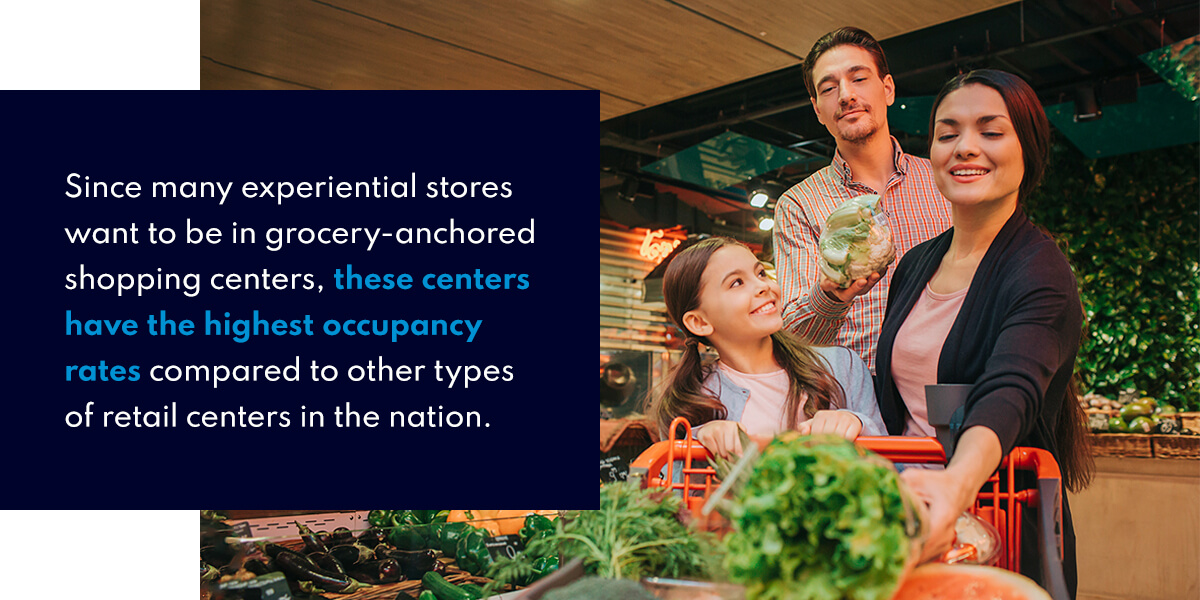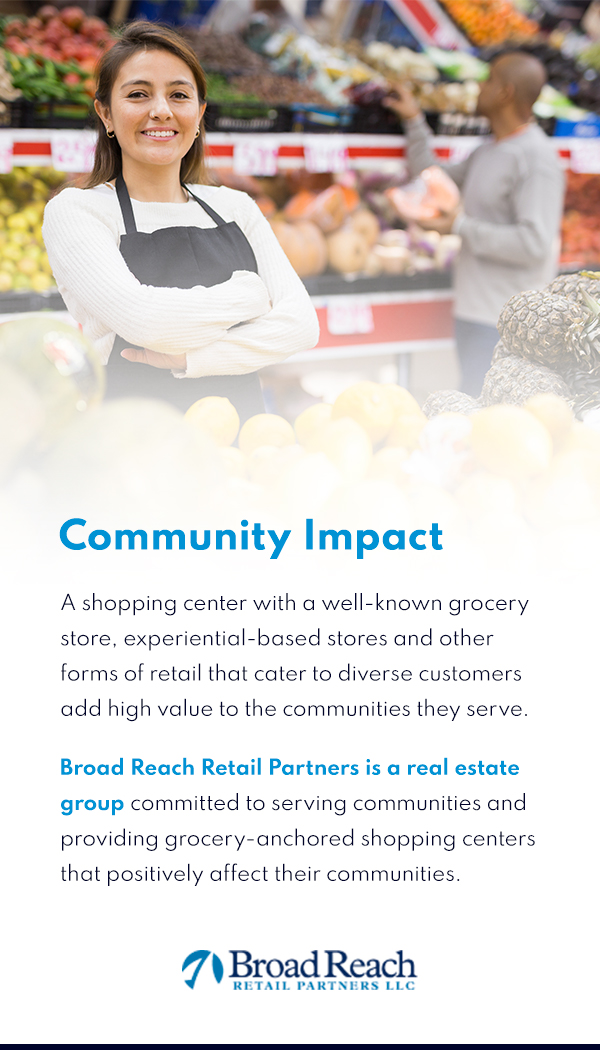Why Grocery-Anchored and Necessity-Based Shopping Centers?

The market shift in retail is drifting away from nonessential retail stores like clothing and electronics. We’ve seen major retail companies file for bankruptcy, further confirming the shift in the market and the companies we see holding onto storefronts. More shopping centers are seeing success for industries like grocery stores, necessity-based stores and experiential-based stores, and for other stores surrounding these industries.
Many experts and real estate professionals are focusing on redeveloping shopping centers and creating more success for retail locations of all industries. By studying the market and understanding the importance of essential businesses and experiential-based retail, it’s beneficial for the main focus of shopping centers to be these types of businesses.
A successful and popular approach for real estate professionals and developers when leasing out shopping centers is creating grocery-anchored and necessity-based shopping centers. This article covers why grocery-anchored shopping centers are so successful.
What Is a Grocery-Anchored Shopping Center?
Shopping centers where a grocery store occupies the majority of the space are considered grocery-anchored shopping centers. The grocery store anchors are surrounded by smaller tenants that can benefit from the customers shopping at the grocery stores.
Grocery-anchored shopping centers are popular investments because they attract shoppers to retail centers. These types of shopping centers are at the top of the list for real estate investors and developers because of their success. Other retailers that attract customers include fitness centers, restaurants, movies theaters and other businesses where you can enjoy a unique experience.
Carefully selecting tenants for shopping centers can help these companies succeed and benefit the entire community. Learn about the different types of necessity-based businesses and experiential-based businesses and how they’re successful in today’s retail market.
Necessity-Based Shopping
Take a trip around your city or town and inspect the shopping centers near you. Many large grocery stores occupy a large portion of a retail center with a selection of small businesses on either side. Grocery stores and other retailers selling necessity-based goods and services help anchor retail centers because they often sell products that people need to shop for. Additionally, many people prefer to purchase these products in-store rather than online.
While some industries are shifting toward online sales, necessity-based shopping retains brick-and-mortar locations. People will always need to purchase items they need, like food and toiletries, and many people visit their local grocery store weekly.
What are necessity-based shopping centers, and what makes them great investments? Check out some of these examples and reasons why grocery-anchored and necessity-based shopping centers are successful:
- While other industries focus on online sales, grocery stores will always have a strong in-person shopping market. Customers rely on their senses to purchase food, like touching produce to ensure it’s ripe, looking at cuts of meat at the deli to see which type is the best and smelling the bread at the bakery before purchasing the loaf. People are also pushing the trend of local and fresh food at specialty grocery stores. Customers are likely to visit other stores in the shopping centers when they visit the grocery store every week.
- Grocery stores stand strong against online retail trends. While other industries may feel the impact of the ever-growing e-commerce market, grocery stores will continue to need physical locations. Some grocery stores also interact with customers online to draw them into their stores. The more customers heading to the grocery store, the more customers will consider entering one of the other stores in the retail center.
- The need for purchasing groceries will always exist regardless of the state of the stock market and other economic factors. Customers will shift their finances around to purchase the food they need for their families. Whether this means skipping out on purchasing a new TV or narrowing their budget for new clothes, food is a necessity to all customers. Grocery stores make a great anchor for shopping centers because of their consistent demand.
Necessity-based shopping stores, like grocery stores, will continue to be a popular investment if they are attached to a shopping center.
Experiential-Based Shopping
More shopping centers are seeing a shift from what people know as traditional tenants, like clothing stores, and seeing tenants that offer necessity-based and experiential-based shopping. Both types of tenants attract customers and provide them with a service or products that are worth visiting a physical location for. While necessity-based shopping locations offer products and services that consumers need, experiential-based shopping provides an immersive or interactive experience.
Experiential-based tenants allow consumers to enjoy a service or complete an activity while in the store. Places like movie theaters, fitness centers, restaurants and salons are all considered experiential-based shopping stores.
Shopping centers anchored with experiential tenants or traditional retail stores don’t receive the same amount of customer traffic or success as grocery-anchored shopping centers. People enjoy visiting experiential-based stores when they want to or when they go out for a special occasion, but their trips aren’t weekly. Studies show that people visit their local grocery store around 1.5 times a week. While e-commerce is taking over some aspects of retail, grocery stores are still holding their own.
People visit the grocery stores often. Because grocery stores see a significant amount of foot traffic every week as opposed to experiential-based stores, this makes the shopping centers they anchor an attractive location for investors and other retail tenants.
Experiential-based stores notice the success that grocery-anchored shopping centers reach and want to occupy these shopping centers. Businesses like theaters, medical tenants, food service companies and other experiential tenants want to situate themselves in the same building as a grocery store because many shoppers on their weekly grocery store trips will see them and think of them when they need those services or want those experiences. Since many experiential stores want to be in grocery-anchored shopping centers, these centers have the highest occupancy rates compared to other types of retail centers in the nation.
The grocery store customer base offers a lot of potential for experiential-based tenants. The influx of customers visiting these shopping centers can make a positive impact on other types of retail stores and open up opportunities for real estate investors.
Customer Experience
A prominent reason why grocery-anchored shopping centers are successful is because of excellent customer experience. Shoppers want to make running errands worth the trip and tackle their shopping goals in the same location.
A shopping center and other stores can benefit from having a grocery store with a well-known name nearby. These big-box stores known in nearly every household can draw customers from all over the community to the shopping center. A popular grocery store can help give smaller retail stores or local tenants in the shopping center a chance to establish credibility in the community. Instead of customers walking by these small shops to go into the grocery store, customers are more likely to spend time exploring the shopping center and popping into multiple shops that catch their eyes after leaving the big-name store. Customers can work out at the fitness center, grab something to eat and stop by a local shop for a few items before purchasing their groceries because they are all in the same convenient location. Including multiple types of retail tenants can improve the customers’ time at the shopping center and keep them returning for more shopping trips.
Customers tend to trust big-name companies more than shops they don’t know about. When a nationwide grocery store anchors a shopping center, customers trust the shopping center more and the other shops surrounding the grocery store. The same credibility factors matter to investors and potential tenants. When investors see a major grocery chain moving into the newest shopping center development, they’re more likely to invest in these retail centers because of their proven success and current popularity among customers. Potential tenants also appreciate the benefit of well-known grocery stores in shopping centers because of the potential traffic to their stores, the credibility tied to their store because of the chain and the convenience the location will provide to customers who want to get as much shopping and errands completed in one location as they can.
Big grocery store chains continue catering to all of their customers by embracing both the in-person and online markets. While the world of e-commerce doesn’t impact grocery stores like it does retail shops for clothing, electronics and other products, it’s still a helpful tool that can gather more customers and lead them into their stores. Grocery stores use digital marketing tools like smartphone apps, social media and paid advertisements to get the attention of potential customers and give them incentives to shop in-store. Some of these incentives may include coupons, curbside pick up, special sales or exclusive in-app deals. Many big-name grocery store chains use these marketing tactics to draw in customers from all over the community.
Customers also visit grocery stores when they need one or more ingredients for a meal they’re cooking. On their trip to the grocery store, they can stop by some of the surrounding shops to pick up a few more things they need. Grocery-anchored shopping centers are convenient for customers and provide an excellent shopping experience for patrons.
Community Impact
While grocery-anchored shopping centers are convenient for their customers, they also provide more value to their surrounding community. A shopping center with a well-known grocery store, experiential-based stores and other forms of retail that cater to diverse customers add high value to the communities they serve.
Providing a location that benefits all members of the community will benefit all people who are involved. Customers can always find something they enjoy, whether that’s eating at their favorite restaurant, watching a new movie or buying their weekly groceries. This variety means these shopping centers make customers happy and become a destination where community members can spend their weekend outings. The shopping center becomes a place where community members can spend time for necessities, like purchasing groceries, and for leisure when they want to eat at a restaurant or go to the fitness center.
New developments of grocery-anchored retail centers can also affect the community by attracting new residents to move to the town. New and relevant shopping centers make locations more enticing to potential residents and offer more activities for people to enjoy on their time off. These shopping centers can help make the community stronger and increase property values in the area. A thriving grocery-anchored shopping center can boost the local economy and benefit chain businesses and local businesses in the shopping center and surrounding area. Quality grocery store-anchored shopping centers can encourage similar developments around the community because of their success. These centers can transform into growth catalysts for communities and make residents happy to live in the town.
Residents also benefit from these grocery-anchored shopping centers by having other quality stores lease out sections of the shopping center. Developers and investors who want these shopping centers to succeed and benefit consumers in the community need stores people value to join the shopping center. Ensuring a good mixture of retail options that will meet multiple residents’ needs is important for investors to consider. Real estate companies take various opportunities like new developments, redevelopment, acquisitions and other leasing services and create valuable shopping centers.
Broad Reach Retail Partners is a real estate group committed to serving communities and providing grocery-anchored shopping centers that positively affect their communities. Our goal at Broad Reach Retail is to transform current shopping centers or develop new ones to serve your communities for the better. We accomplish this by strategically finding tenants for grocery-anchored shopping centers that will complement each other and give residents a quality shopping experience. We strive to create value for communities, for our partners, for our properties and for the retail real estate industry.
Broad Reach Retail Partners Real Estate Services
Grocery-anchored shopping centers often exceed expectations. Real estate investors see them as reliable properties, and residents appreciate their convenience and positive impact on their town. While headlines may state that retail stores are going fully online, grocery stores will continue to draw people every day regardless of the e-commerce market.
Broad Reach Retail Partners has a team of retail real estate veterans who work hard to make a positive impact on communities with grocery-anchored retail centers. Our team develops grocery-anchored shopping centers because we believe they are essential to communities. Our management team builds up these shopping centers by maintaining investor relations and offering other services like leasing, acquisitions, brokerage and property management.
Learn more about our investment opportunities or a property listing. Contact us today to get more information about our services and why grocery-anchored shopping is a great investment.




